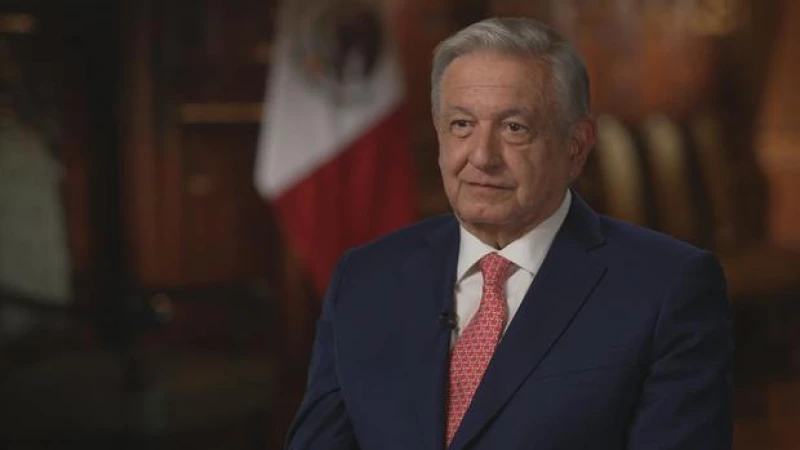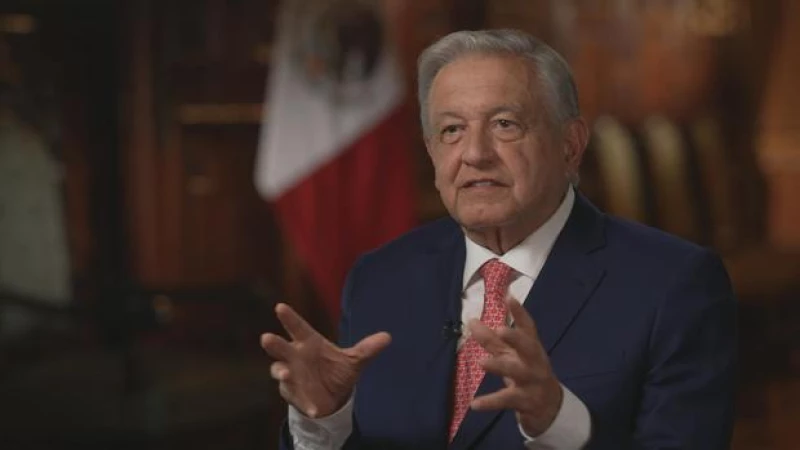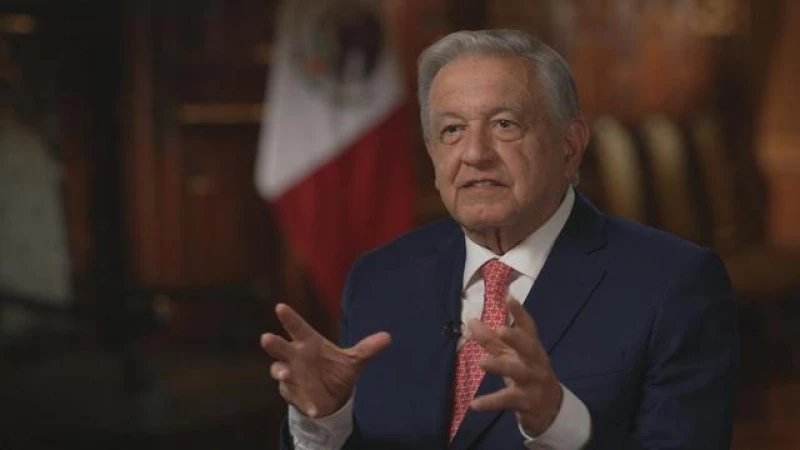As Mexican President Andrés Manuel López Obrador's term nears its end, his actions — or inactions — at the border could significantly impact the upcoming political landscape in the United States.
In December, the White House experienced López Obrador's influence firsthand. Following a historic 250,000 migrants
With the attention of the White House, López Obrador presented his proposal to tackle the root causes of migration problems: urging the U.S. to allocate $20 billion annually to impoverished nations in Latin America and the Caribbean, remove sanctions on Venezuela, lift the Cuban embargo, and provide legal status to millions of law-abiding Mexicans residing in the U.S.

During a frank discussion with "60 Minutes," López Obrador discussed his legacy, the border crisis, and his new strategy to combat the cartels.
His message was clear on immigration: the flow of migrants will continue if the U.S. doesn't address the root causes. López Obrador's critics, meanwhile, have said that what he is asking for to help secure the border is diplomatic blackmail.
"I am speaking frankly, we have to say things as they are, and I always say what I feel," López Obrador said in Spanish at the National Palace in Mexico City. "I always say what I think."
Why López Obrador says a border closure will never happen
López Obrador is known for speaking his mind every weekday at his press conferences.
On the border, López Obrador said that when former President Donald Trump says he is going to shut down the border or build a wall, he's bluffing.
Despite their ideological differences and tensions at the border, López Obrador built a working relationship and a personal rapport with the former president.
In 2020, Mr. Trump hosted López Obrador at the White House to mark the United States-Mexico-Canada Agreement (USMCA). Speaking before the agreement was signed in the Rose Garden, Mr. Trump said that "the relationship between the United States and Mexico has never been closer."
López Obrador doesn't think Trump will ever fully shut down the border "because he needs Mexico," the 70-year-old president said.
"The economic and commercial agreement we signed has been beneficial for both nations because of our mutual understanding," stated López Obrador. "President Biden is aware of this as well."
In the previous year, Mexico emerged as the primary trading partner of America. López Obrador emphasized the significance of the automotive industry, highlighting that car prices could increase by up to $15,000 if the border was shut down.
"Both Mexico and the United States have essential factories that cater to consumers in both countries," López Obrador remarked.
Cartels and the Fentanyl Issue
Despite Mexico's role as a significant importer and exporter, it remains a key source of fentanyl and a transit point for other illicit drugs entering the U.S., as per the U.S. State Department.
López Obrador is keen to mention that fentanyl is also manufactured in the U.S. and Canada, with most of the necessary chemicals sourced from Asia. Nonetheless, U.S. authorities attribute a majority of fentanyl trafficking to Mexican cartels.
López Obrador has faced backlash for his strategy towards combating violence and organized crime. He has focused on initiatives such as college scholarships and job opportunities to steer young individuals away from cartel involvement, a strategy he terms as "Hugs, Not Bullets."
Under the leadership of López Obrador, the federal police have been dissolved and a national guard has been created to handle public security.
Since assuming office in 2018, the Mexican government reports a nearly 20% decrease in homicides. However, with approximately 30,000 homicides still occurring annually in Mexico, concerns remain about the low prosecution rate for these crimes.
"We do prosecute them," López Obrador stated. "There is no impunity in Mexico. All offenders are brought to justice."

Research from México Evalúa, a Mexican think tank, indicates that only about 5% of the country's homicides result in convictions. Additionally, a study conducted last year highlighted this issue.
Despite suggestions for negotiating truces with cartels, López Obrador remains firm on his stance. "The approach to criminals should be through law enforcement. I will not engage in any form of communication with them," he affirmed.
Challenges of Violence and Corruption
Throughout his campaign, López Obrador pledged to combat corruption, alleviate poverty, and tackle violent crime. He asserts that corruption has been effectively eradicated under his administration.
Upcoming Elections in Mexico
The upcoming elections in Mexico on June 2 are set to be one of the largest in the country's history. Alongside the presidential race, there are 20,000 local positions up for grabs. However, the shadow of organized crime looms large over the electoral process.
Reports suggest that cartels have been involved in funding certain candidates while targeting others. Recent incidents include the killings of two mayoral candidates in Guerrero and Michoacán, highlighting the dangers faced by those in the political arena.
Despite these challenges, President López Obrador has taken a strong stance against corruption and excess. He has reduced his own salary, sold off luxurious assets like the presidential jet, and opted for a modest Volkswagen as his mode of transport.
In a statement, López Obrador emphasized his commitment to grassroots engagement, stating, "I can travel throughout the entire country without problem. There is no region that I cannot go and visit."
While concerns about safety and security persist, the president remains optimistic about the integrity of the electoral process, assuring candidates of their safety as they campaign for office.
López Obrador's hand-picked successor, former Mexico City Mayor Claudia Sheinbaum, has a commanding lead in the polls and could become Mexico's first female president. López Obrador said he intends to retire from politics after he leaves office.
López Obrador's legacy
Last year, the Mexican economy grew 3% and unemployment hit a record low. The president's critics say the growth isn't because of his policies, but rather in spite of them.
López Obrador has directed billions to signature mega projects, including an oil refinery in his home state and a railroad through the Yucatan jungle to promote more tourism.
"It is money very well invested. It is money saved by not permitting corruption," López Obrador said.
During his term, nearly 10 million Mexicans have been lifted from poverty. López Obrador is known for railing against what he sees as the elite.
The popular leftist has favored spending on social programs, doubling the minimum wage, increasing pensions and scholarships. His approval rating has remained high — above 60% for most of his presidency.
Some of his critics have said he's popular because he gives people money. López Obrador said there's some truth to that.
"Our formula is simple. It is not to allow corruption; not to make for an ostentatious government, for luxuries; and everything we save, we allocate to the people," he said.ffem







